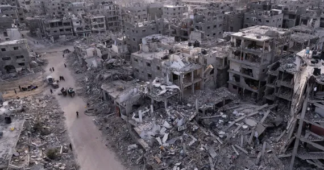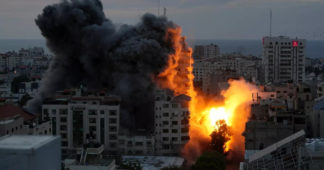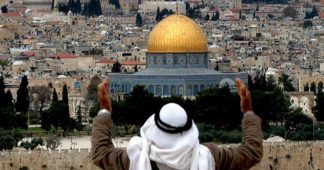Trump’s call to ‘clear out’ Gaza has sparked anger in Amman, with well-placed sources telling Middle East Eye that the US ally is prepared for war
By Peter Oborne and Richard Sanders in Amman
Feb 4, 2025
Jordan is ready to declare war on Israel in the event that Prime Minister Benjamin Netanyahu attempts to forcibly expel Palestinians into its territory, Middle East Eye understands.
The warning comes in the wake of repeated statements from US President Donald Trump that he would like to see Jordan and Egypt take in Palestinians as part of a move to “clean out” the Gaza Strip.
Well-placed sources in Amman and Jerusalem told MEE that the last thing Jordan wants is war and it is eager for a peaceful solution. But they are adamant that the Jordanians will close the border if refugees begin to cross into the country.
If the Israelis seek to re-open it, that would be “a casus belli,” one source said.
The Jordanians are under no illusion they could win a war with Israel, but believe they would have no choice but to fight.
ordan previously sent extra battalions to its western borders following an unambiguous statement from Amman that it would view any attempt to force Palestinians across the border as a gross breach of the country’s 1994 peace treaty with Israel.
Israel responded by creating a new eastern division to guard its border with Jordan.
One source told MEE that Trump’s proposal was an “existential issue” both for Jordan and the Hashemite dynasty, pointing out that the country is the third-poorest in terms of water in the world.
Its 12 million people live largely in a strip of land along the Israeli border, close to the Jordan River. It would simply be unable to accommodate a significant inflow of refugees, they said.
Jordan’s red line
While the Israelis with their vastly superior military resources might quickly win a conventional victory, they would be left having to hold down a sprawling territory with an open desert frontier to the east.
The Israeli border with Jordan stretches for 400km, almost the entire length of the country and 10 times longer than Israel’s boundary with Gaza. Much of the border area is mountainous, rugged and in parts almost impossible to police.
This raises the prospect of the kind of protracted guerrilla campaign that ultimately drove the Americans from Iraq and Afghanistan. It would almost certainly draw in fighters from Syria, Iraq, Saudi Arabia and other Arab countries. Jordan has an open desert border to the east.
For many years Jordan has provided stability on Israel’s eastern border – stability that would vanish overnight if war broke out.
Relations between the two states have been cool in any case. The Jordanian government has made no secret of its mounting horror at the assault on Gaza and the wave of settler atrocities and ethnic cleansing in the West Bank.
Shortly after the start of the conflict in Gaza in October 2023, Jordan’s King Abdullah declared: “On the issue of refugees coming to Jordan… that is a red line.”
Yet last week Trump declared he had spoken to King Abdullah and told him: “I’d love you to take on more,” as part of a plan to “clean out” 1.5 million people from the Gaza Strip.
During meetings with European officials in Brussels on Wednesday, King Abdullah reiterated “Jordan’s unwavering opinion on the necessity of establishing Palestinians on their land and gaining their legitimate rights, in accordance with the two-state solution.”
Jordan’s Foreign Minister Ayman Safadi similarly said on Monday that “any discussion on an alternate homeland [for the Palestinians]… is rejected”.
The situation is made much more complicated by the fact that Trump has already cut US aid to Jordan, and there are fears that the US president may make Jordanian acceptance of Palestinian refugees a condition of restoration of aid. The presence of US bases in Jordan is a further complexity.
An influx of refugees would upset the country’s delicate ethnic balance. More than 2 million Jordanians are registered as Palestinian refugees. Other estimates put the figure far higher, possibly a majority of the population.
Instability and ethnic strife
The rapid influx of refugees into Jordan during the Nakba in 1948 and again in 1967 led to Black September in 1970, when the Hashemite dynasty crushed Palestinian factions it feared were seeking to take over the state.
Sources say that Jordan fears an influx of refugees would lead to renewed civil strife. Jordan’s population has already been angered by the conflict in Gaza, and refugees from Gaza and the West Bank would constitute an additional destabilising factor.
On Saturday, top diplomats from Egypt, Jordan, the United Arab Emirates, Saudi Arabia and Qatar rejected any forcible displacement of Palestinians during a meeting in Cairo.
“We affirm our rejection of [any attempts] to compromise Palestinians’ unalienable rights, whether through settlement activities, or evictions or annex of land or through vacating the land from its owners… in any form or under any circumstances or justifications,” the countries said in a joint statement.
Versions of Trump’s proposal to export Palestinians to Jordan date back at least as far as the so-called Allon Plan, named after the Israeli politician Yigal Allon. In the wake of the 1967 war, Allon called for the annexation of much of the West Bank.
The Hashemites are also the custodians of the Islamic and Christian holy sites in Jerusalem. Any move to demolish the Dome of the Rock or Al-Aqsa Mosque to build a third Jewish temple – a cherished aim of many far-right groups in Israel – would also be a casus belli, the sources said.
Worryingly, even Pete Hegseth, Trump’s new defence secretary, has recklessly called for the building of a third Jewish temple on the site of Al-Aqsa Mosque in Jerusalem.
We remind our readers that publication of articles on our site does not mean that we agree with what is written. Our policy is to publish anything which we consider of interest, so as to assist our readers in forming their opinions. Sometimes we even publish articles with which we totally disagree, since we believe it is important for our readers to be informed on as wide a spectrum of views as possible.











